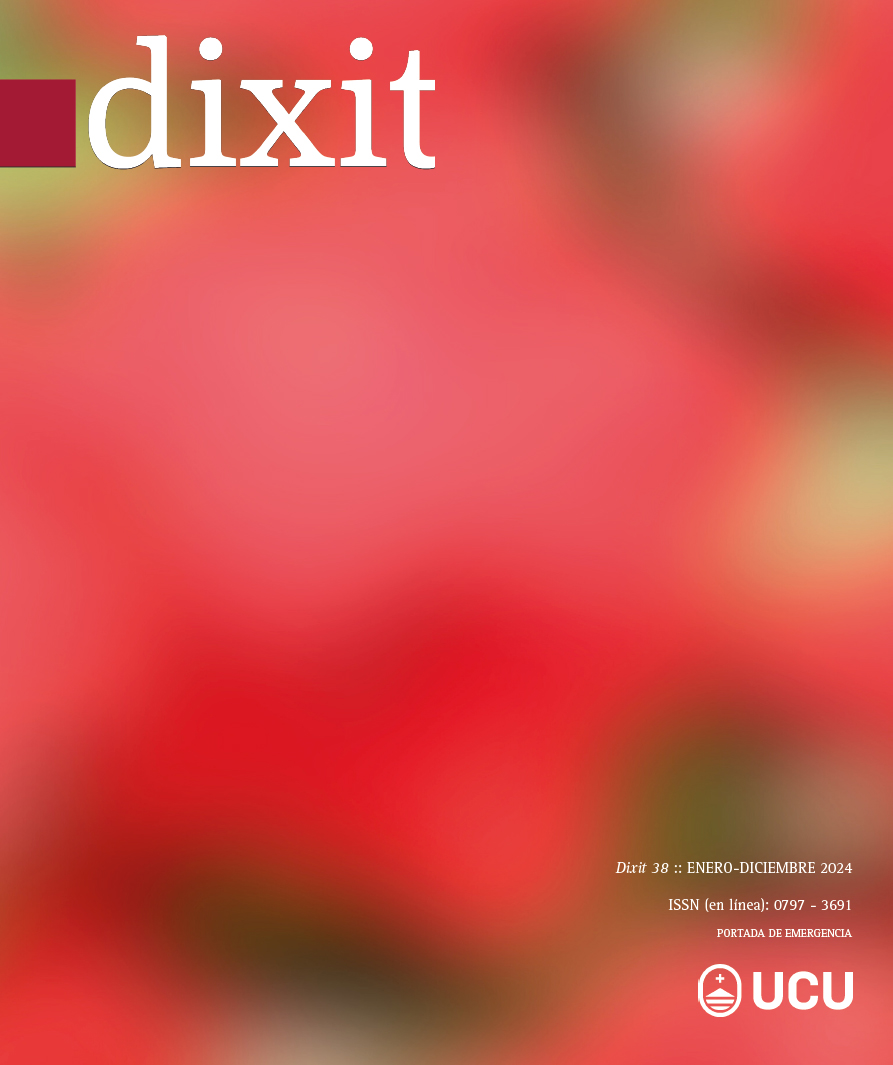Sentimientos estratégicos: la respuesta de la Comisión Europea en las redes sociales a la crisis entre Rusia y Ucrania
DOI:
https://doi.org/10.22235/d.v38.3644Palabras clave:
comunicación de crisis, estrategia digital, Comisión Europea, análisis de sentimientos, acontecimientos geopolíticosResumen
El uso de plataformas en línea por parte de la Comisión Europea, especialmente durante la crisis entre Rusia y Ucrania en el contexto de la era digital, ofrece perspectivas informativas sobre la comunicación de crisis actual. Este estudio analizó las actividades de la Comisión en las principales plataformas, Facebook y Twitter, entre el 1 de febrero y el 26 de octubre de 2022. Para llevar a cabo este análisis, se utilizó RStudio y el paquete SentimentAnalysis dentro de R. Además, se empleó Blake & Mouton’s Grid como punto de referencia para extraer las dimensiones estratégicas. Los datos revelaron distintos patrones de uso por parte de la Comisión: Twitter actuó como canal para actualizaciones rápidas e inmediatas, aprovechando sus capacidades de comunicación en tiempo real, mientras que Facebook se utilizó para conversaciones más detalladas con un público más amplio. En cuanto al sentimiento, la mayoría de las comunicaciones de la Comisión tuvieron un tono neutro o positivo. No obstante, hubo casos en los que determinadas cuestiones críticas llevaron a la Comisión a adoptar posturas definidas, lo que permitió conocer su intención estratégica y sus prioridades. En resumen, la comunicación en línea de la Comisión Europea durante el período en cuestión mostró una metodología informada y específica para cada plataforma. Al comprender y mejorar las funcionalidades de las plataformas y las preferencias de la audiencia, la Comisión estableció una estructura de comunicación que puede servir de modelo para las entidades que pretendan simplificar sus procedimientos de interacción digital, especialmente en caso de crisis.
Descargas
Citas
Barton, L. (1993). Crisis in organizations: Managing and communicating in the heat of chaos. South-Western Pub.
Blake, R. R., & Mouton, J. S. (1970). The Fifth Achievement. The Journal of Applied Behavioral Science, 6(4), 413-426. https://doi.org/10.1177/002188637000600403
Coombs, W. T. (2021). Ongoing crisis communication: Planning, managing, and responding. Sage.
European Commission [@EU_Commission]. (2022, March 18). Denying Russia’s most-favoured-nation status means that the country may be subject to higher tariffs and import bans [Image attached] [Post]. X. https://x.com/vonderleyen/status/1496095277811388416
Fadel Arandas, M., & Yoke Ling, L. (2021). The Russian Crisis Communication Response Beyond Mh17 Tragedy. In C. S. Mustaffa, M. K. Ahmad, N. Yusof, M. B. M. H. Othman, & N. Tugiman (Eds.), Breaking the Barriers, Inspiring Tomorrow, vol 110. European Proceedings of Social and Behavioural Sciences (pp. 58-65). European Publisher. https://doi.org/10.15405/epsbs.2021.06.02.8
Gurkov, I., & Dahms, S. (2024). Organizational communication strategies in response to major disruptions: The case of the worsening situation in the Russia-Ukraine conflict. International Journal of Organizational Analysis, 32(6), 1127-1140. https://doi.org/10.1108/IJOA-03-2023-3658
Hăbășescu, M. (2015). Comunicarea de criză, factor indispensabil în consolidarea reputației firmei. In Strategii şi politici de management în economia contemporană (4 ed., pp. 134-138). Departamentul Editorial-Poligrafic al ASEM.
Kearney, M. W., Sancho, L. R., Wickham, H., Heiss, A., Briatte, F., & Sidi, J. (2023). rtweet: Collecting Twitter Data (1.1.0) [Computer software]. https://cran.r-project.org/web/packages/rtweet/index.html
Lichtenstein, D., & Koerth, K. (2022). Different shows, different stories: How German TV formats challenged the government’s framing of the Ukraine crisis. Media, War & Conflict, 15(2), 125-145. https://doi.org/10.1177/1750635220909977
Manfredi-Sánchez, J.-L., & Smith, N. R. (2022). Public diplomacy in an age of perpetual crisis: Assessing the EU’s strategic narratives through six crises. Journal of Communication Management, 27(2), 241-258. https://doi.org/10.1108/JCOM-04-2022-0037
Mir, A. A., Rathinam, S., Gul, S., & Bhat, S. A. (2023). Exploring the perceived opinion of social media users about the Ukraine–Russia conflict through the naturalistic observation of tweets. Social Network Analysis and Mining, 13(1), 44. https://doi.org/10.1007/s13278-023-01047-2
Newsom, D., VanSlyke Turk, J., & Kruckeberg, D. (2010). Totul despre relațiile publice (2nd Edition). Polirom.
Nisch, S. (2024). Invasion of Ukraine: Frames and sentiments in Zelensky’s Twitter communication. Journal of Contemporary European Studies, 32(1), 110-124. https://doi.org/10.1080/14782804.2023.2198691
Olivares García, F. J., Román San Miguel, A., & Méndez Majuelos, I. (2022). Social networks as a journalistic communication tool. Volodímir Zelenski’s Digital Communication Strategy during the Ukraine war. Visual Review. International Visual Culture Review, 11(2), 1-12. https://doi.org/10.37467/revvisual.v9.3660
Pauchant, T. C., & Mitroff, I. (1992). Transforming the Crisis-Prone Organization: Preventing Individual, Organizational, and Environmental Tragedies. Jossey-Bass.
Plazas-Olmedo, M., & López-Rabadán, P. (2023). Selfies and Speeches of a President at War: Volodymyr Zelensky’s Strategy of Spectacularization on Instagram. Media and Communication, 11(2), 188-202. https://doi.org/10.17645/mac.v11i2.6366
Proellochs, N., & Feuerriegel, S. (2021). SentimentAnalysis: Dictionary-Based Sentiment Analysis (1.3-4) [Computer software]. https://cran.r-project.org/web/packages/SentimentAnalysis/index.html
Vasile, A. A. (2023). Formal, Non-formal, and Informal Approaches in Prosocial Crisis Communication while Dealing with Refugees from Conflict Areas. BRAIN. Broad Research in Artificial Intelligence and Neuroscience, 14(1), Article 1. https://doi.org/10.18662/brain/14.1/412
von der Leyen, U. [@vonderleyen]. (2022a, February 22). Russia's aggression against Ukraine is illegal and unacceptable. The Union remains united in its support for Ukraine's sovereignty and territorial integrity [Thumbnail with link attached] [Post]. X. https://x.com/vonderleyen/status/1496095277811388416
von der Leyen, U. [@vonderleyen]. (2022b, February 24). Russian forces invaded Ukraine, a free and sovereign country. We condemn this barbaric attack, and the cynical arguments used to [Link attached] [Post]. X. https://x.com/vonderleyen/status/1496749941301121027
von der Leyen, U. [@vonderleyen]. (2022c, March 10). The bombing of the Mariupol maternity hospital is inhumane, cruel and tragic. I am convinced that this can be a war crime [Image attached] [Post]. X. https://x.com/vonderleyen/status/1496095277811388416
Witt, J. L., & Morgdan, J. (2003). Stronger in the Broken Places: Nine Lessons for Turning Crisis into Triumph. Time Books.
Descargas
Publicado
Cómo citar
Número
Sección
Licencia
Derechos de autor 2024 Dixit

Esta obra está bajo una licencia internacional Creative Commons Atribución 4.0.
Desde el n.º 32 en adelante todos los contenidos se encuentran bajo la Licencia Creative Commons Atribución 4.0 Internacional (CC BY 4.0).
Las ediciones número 29-31 se encuentran bajo la Licencia Creative Commons Atribución-NoComercial 4.0 Internacional.
Los contenidos correspondientes a los números 28 y anteriores se encuentran bajo la Licencia Creative Commons Atribución-NoComercial-CompartirIgual 4.0 Internacional.


















